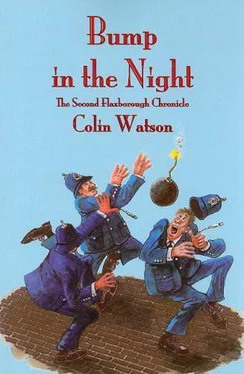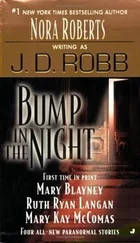After describing the bomb damage in somewhat tiresome detail, Elsie drew from his brief-case the minutes of the committee meeting and read a carefully condensed account of what members had had to say about the turning of blind eyes and the standing out of sore thumbs.
When he had come to the end of this document, he said: “Of course, I need hardly point out, Mr Chief Constable, that our reference today to the allegations is in the strictest confidence. Some of them may well be actionable. We quote them solely to give you an idea of public feeling, however unwisely you may think it has been expressed.”
“I quite understand,” replied Mr Hessledine. He paused for a few moments and said with a faint smile: “It all sounds rather sinister, doesn’t it, gentlemen? One thing—your committee has been very sensible, I think, in deciding to be frank with us—with the police, I mean.”
Councillor Pointer glanced up from a survey of his shoes to see the Chief Constable looking at him with polite concern. “Tell me, Mr Pointer, as the target of some of these unfortunate innuendoes, what do you feel about the affair? I must say, incidentally, that I much admire your courage in coming along here and taking the bull by the horns, so to speak.”
Pointer gave no sign of being cheered by the compliment. “All I want,” he said harshly, “is the scotching of these damnable rumours. Make what investigations you like. I’ve nothing to hide. Fire away and see if I care!”
“But I’ve no intention of firing at anybody, Mr Pointer. I was under the impression that you and your colleagues had come to fire at me.”
Alderman Haskell champed portentously three times and spoke. “The point with me, Mr Chief Constable, is this. Chalmsbury, as you doubtless know is not a big town and the police have a very fair idea of who’s who. In the ordinary way of wrong-doing, they never have much difficulty in putting their hands on the person responsible. Quite often someone will come along and tell them; we’re quite neighbourly, you know. Well, we’ve certainly never before had the same trick played three times in a row and nobody under lock and key at the end of it.”
“There must be a first time for everything,” the Chief Constable observed.
“Yes and no,” said the alderman, who tried always to see both sides of a question. “But be that as it may, our committee is far from satisfied that everything possible is being done in this case.”
Elsie, who had been perched on the edge of his chair in readiness to extinguish with lawyer’s qualifications any indiscretion that his companions might drop, shifted to a more comfortable position. “I think,” he said, “that I should respectfully advise these gentlemen to regard their points as made and to elaborate no further. Unless, of course, the Chief Constable wishes to put any questions.”
Giving him a little bow, Mr Hessledine glanced at a piece of paper on which he had been unobtrusively pencilling a few notes.
“There has been mention of a confession, gentlemen,” he began. “That, I admit, is news to me. I shall have inquiries made, but I shall not be at all surprised to learn that my officers at Chalmsbury had good reason to ignore this confession, or whatever it was. Jokers and half-wits are forever giving themselves up for things that happen to have caught their imagination.
“The rest of what you say is rather more serious, isn’t it?”
He folded his arms and looked briefly at each of the deputation. Then he swung his chair through a quarter turn, fixed his gaze on the ceiling and continued talking quietly, like a tutor recapitulating for the benefit of tiresomely zealous students.
“You naturally will understand that I cannot accept the implied criticism of Chief Inspector Larch and that my position obliges me to refute, in the absence of evidence, the suggestion that he has some ulterior motive for leaving this dynamiter of yours at large. I might reasonably feel very angry about what you have said, but I recognize that you are doing an official duty, as you and your colleagues see it, and also that these crimes must have put you all under a considerable strain.
“Now this is what I propose.
“Officially, I must send you away with a flea in your ear, so to speak. Unofficially, though, I shall do what I can to give our fellows over in Chalmsbury a little help in running this character to earth. You mustn’t ask me to be more explicit, gentlemen. The less that’s known, the more effective the help I have in mind will be.”
This pleasantly mysterious undertaking having been won, the trio took leave. Even Councillor Pointer felt that things could have gone far worse.
When he was alone once more, the Chief Constable allowed his expression to lapse into something a good deal more like anxiety than he would have permitted his visitors to see. He stared moodily at the telephone, then suddenly picked it up and asked to speak to Mr Chubb on his private line.
Harcourt Chubb was the Chief Constable of Flaxborough, the county town. He was a tall, ascetic-looking man who had scarcely ever been seen by his subordinates to sit down. This was not because he was energetic: his devotion to a quiet life was almost religious; but because he had learned that his insistence on standing in the seated presence of callers disheartened petitioners, frustrated complainants and generally reduced interviews to a minimum.
The system did not work over the telephone, of course.
“Harcourt! My dear fellow, how are you?” The County Chief Constable’s swift injection of bonhomie left Mr Chubb paralysed, as though by a curare-tipped arrow.
“I’m in something of a fix, Harcourt. A very delicate matter, as it happens... No, I’m sorry, it must be over the phone: I simply can’t get round at the moment and things won’t wait. Most of the explaining I’ll do later, of course... Yes, it would be nice to get together again. Dogs all well?... Fine. And Mrs Chubb?... Anyway, to get down to brass tacks I want to borrow one of your men for a spell. One who’s unlikely to be known in Chalmsbury...Chalmsbury, yes. And I want someone a cut above those layabouts in dirty raincoats who can do nothing but harrass bookies for free bets. A real detective, old man. Now then, can you run to one?”
Mr Chubb explained icily that all his detectives were real.
“Naturally, my dear fellow. I was just pulling your leg. You know the man I want—cleared up that fearful brothel and butchery business of yours last year 1...Purbright, yes, that’s the chap... Hard to say; two or three weeks possibly. Depends how lucky or good he is...I say, that really is uncommonly obliging of you, Harcourt... You will? Fine! And I’ll tell you the whole story when we meet. Keep your powder dry, old man!”
Hessledine replaced the phone with a God-forgive-me expression. The affectation of heartiness pained him a good deal, but he knew it was the only weapon to use upon Chubb, who would have parried any reasonably delivered request with courteous obtuseness and painstaking prevarication.
1Reported in Coffin Scarcely Used
“Chief Inspector Larch? My name is Purbright. Flaxborough C.I.D. I expect the Chief Constable...”
“Of course, Mr Purbright.” Larch coldly appraised the man whose hand he shook. He was nearly as tall as himself, of slightly diffident manner and with a quick, apologetic smile. The fresh-complexioned face had a touch of foolish amiability about the mouth. Above grey eyes, steadily interested, it seemed, in what they saw, the high forehead was crowned with short but unruly hair of preposterous king-cup yellow.
“Yes, I’d heard you were being loaned to us in our distress.” Larch resumed his seat and waved Purbright to another. “I only hope someone’s told you what you’re supposed to do. We”—he gestured largely with his hand—“are baffled.”
Читать дальше












